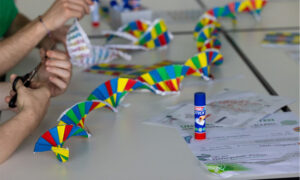
Read the latest Issue
Members of EMBL’s Equality, Diversity and Inclusion Committee explain how EMBL is choosing to challenge through its LEAP mentoring programme

By Roshni Mooneeram: LEAP Programme Manager, EMBL Equality, Diversity and Inclusion Officer & Eileen Furlong: Chair of EMBL’s Equality, Diversity and Inclusion Committee, Group Leader, Head of Genome Biology Unit, Member of EMBL Directorate
“I felt quorum sensing, like bacteria do, and I felt I am not alone in this journey as a woman in academia.”
—LEAP programme participant
The theme of International Women’s Day this year is #ChooseToChallenge. In that spirit, EMBL’s Equality, Diversity and Inclusion (EDI) Committee has captured the experiences of the 23 pioneering postdocs who were selected for the first Leadership and Excellence for Aspiring Postdocs (LEAP) programme at EMBL. LEAP is part of EMBL’s larger EDI strategy and commitment to advancing the leadership role of women in science by redressing the ‘leaky pipeline’ to senior roles. LEAP is an innovative mentoring and coaching programme with action learning designed to enable women postdocs to challenge themselves and their environment as they strive for their next career step as a group leader, principal investigator, or assistant professor in their field. LEAP is generously funded by the Friends of EMBL, and kindly supported by EMBL’s alumni who are acting as external mentors, all of whom are group leaders or professors in universities or other institutes.
The significant gender imbalance in science leadership positions in academia is well documented. In our efforts to challenge this imbalance, and to start to level the playing field, we questioned if we were doing enough at EMBL. To increase the number of women researchers in leadership positions, we realised that we need to provide our women postdocs with the tools they need to climb the career ladder.
LEAP is learner led, using best practices in gender-inclusive leadership development. We also built in a strong sense of agency in both the design and the offering. The programme was built from scratch and tailor-made to the postdocs’ exact leadership learning needs. The current LEAP participants have selected their mentors and have established productive relationships that are helping them to develop their research vision and grow their networks. The workshops and one-to-one coaching sessions were co-developed with the LEAP postdocs at every step of the way. The professional training company that we have engaged has over 20 years of experience in coaching and development. Even with that background, our specific requirements for the LEAP programme have challenged them to think of new angles to gender and leadership training, enabling them to create a new pathway.
The programme is still in its early stages, but we are already receiving very positive feedback from our LEAP fellows. As one puts it: “What I like about the LEAP programme is that it is eventually a very concrete and sustainable action to encourage female postdocs to stay in academia and thus to increase the number of female PIs.”
EMBL alumni in leadership positions have volunteered as external mentors in LEAP, and play a key role by making time to nurture the aspirations of the postdocs. As another LEAP participant says: “To me, so far, the best part of the programme is to be able to have access to a mentor who is outside of our field. My discussions with my mentor were always very motivating and this relationship will help me in my next career steps.”
LEAP is paving the way for women postdocs to define their own unique, authentic leadership pathways: “I always had the feeling that, if I really wanted to ‘make it’, I would need to compromise on my values at some point, or make some decisions that would leave me feeling guilty. The LEAP programme has shown me that there’s room for kind, caring scientists, as long as we support each other and change the research culture.” There is also a clear realisation that one dominant model does not and should not suit everyone: “There are a lot of different ways to succeed in a career in science, and there is no one single ‘perfect’ path, or ‘one type’ of successful group leader.” LEAP provides space for personal leadership development: “LEAP pushes me to take the time to think where I want to go and how I will get there, to think about my opportunities and challenges, how I can grow. During everyday life these topics are easily pushed aside. It made me discover personal strengths that I wasn’t aware of.”
Community, peer learning, and networks are strategic assets in leadership development: “I was surprised to see that many people have similar concerns, worries, and face similar obstacles, some imposed by the environment, some imposed by our internal beliefs.” A sense of community of practice was identified as being key to individual success: “We are exposed to more than 25 new role models of strong women in science, who combine a career in research with all aspects of family and personal lives and each strive in their own unique way.” There is a strong ambition to both create their own path and build a legacy of diversity in leadership roles in science: “We want to build a strong community and support each other in taking our own and very diverse ways to strive in science, thus inspiring future generations of researchers of all genders and backgrounds.”
We will carry out a full evaluation of the LEAP programme this summer. Meanwhile, it is very encouraging to see that, in being bold, innovative, and rigorous, the LEAP programme is already having a positive impact. Based on the evaluation data gathered so far, LEAP is on track to achieve its goals and could have a knock-on benefit of attracting more women to pursue postdoctoral training at EMBL. As part of EMBL’s EDI strategy, we will explore the possibility of extending the programme to other under-represented groups of researchers, and will take into account intersectionality in our approach in future.
Looking for past print editions of EMBLetc.? Browse our archive, going back 20 years.
EMBLetc. archive